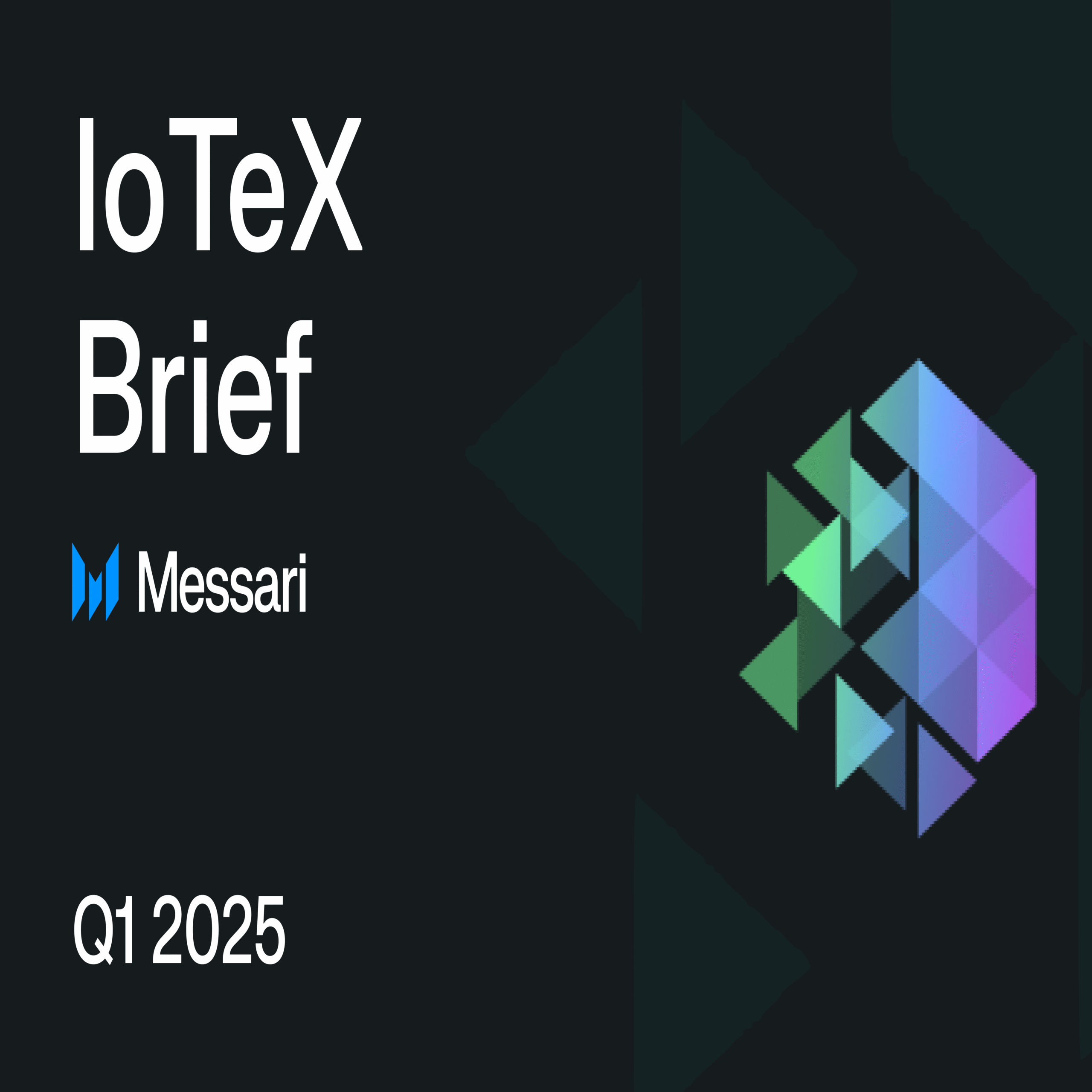Key Insights
- In Q1, IoTeX introduced Quicksilver, a DePIN infrastructure module that enables AI agents to act on decentralized physical data.
- IoTeX launched partnerships with GEODNET and Nubila to integrate their devices with the ioID module. This introduced machine verifiability and enabled verified data uploads on the IoTeX blockchain to feed the Quicksilver framework.
- Average daily active wallets declined 21% QoQ to 8,900 but were still up 850% YoY and average daily transactions fell 23% QoQ to 296,500 but were still up 2,250% YoY.
- Total fees on IoTeX decreased 55% QoQ to $201,000, but were still up 980% YoY. QoQ fee decline was driven by a 66% decrease in gas fees to $53,000 and a 65% decrease in DEX fees to $50,000. ioID activation fees declined only 36% QoQ to $98,000.
Primer
IoTeX (IOTX) is a modular infrastructure platform that supports developers of decentralized physical infrastructure networks (DePIN). The IoTeX Network combines its EVM-compatible Layer-1 (L1) blockchain, offchain compute mid-layer, and open hardware to connect real-world data from devices, machines, and sensors with onchain decentralized applications (dapps). Users can stake the network’s native token (IOTX) to vote for one or more community-elected delegates to manage securing the network, validating transactions, and producing new blocks on the IoTeX Network. Users also use IOTX to pay for gas fees on the IoTeX L1 blockchain. The IoTeX L1 utilizes a Randomized Delegated Proof-of-Stake (Roll-DPoS) consensus mechanism, randomly selecting 24 of the top 36 delegates every hour to secure the network.
IoTeX’s latest product release, Quicksilver, introduces a framework for integrating DePINs with AI agents. Quicksilver enables real-time data processing, adaptive responses, and AI-driven interactions with the physical world. IoTeX aims to have DePINs function as “sensory organs” for AI agents, leveraging decentralized networks of IoT devices to collect and share real-world data. These devices provide continuous data streams verified using ZK proofs, allowing AI agents to sense, interpret, and respond to their environments.
At the core of Quicksilver is ioID, a decentralized identity (DID) protocol that creates onchain entities with verified identities for hardware devices, such as smart devices and sensors. The ioID protocol enables interoperability between protocols and secure agent-to-agent communications to orchestrate blockchain-based AI agent swarms, where multiple specialized agents collaborate to solve complex problems.
BinoAI is IoTeX’s DePIN-oriented AI agent built on Quicksilver. It operates as an expert voice that autonomously tweets and shares knowledge about DePIN projects. For a full primer on IoTeX, refer to our Initiation of Coverage report.
Website / X (Twitter) / Telegram
Key Metrics
Network Overview
IoTeX is a modular, end-to-end tech stack that supports proof of real-world activity for DePIN projects. It does so through its L1 blockchain, DePIN Infrastructure Modules (DIMs), and governance tools. DIMs provide data ingestion, identity management, data verifiability and more.
Usage
Demand for the IoTeX L1 blockspace comes from more than 120 dapps that need device data tracking and offchain compute capabilities. The real-world data is sourced primarily from smart devices, machines, and sensors.
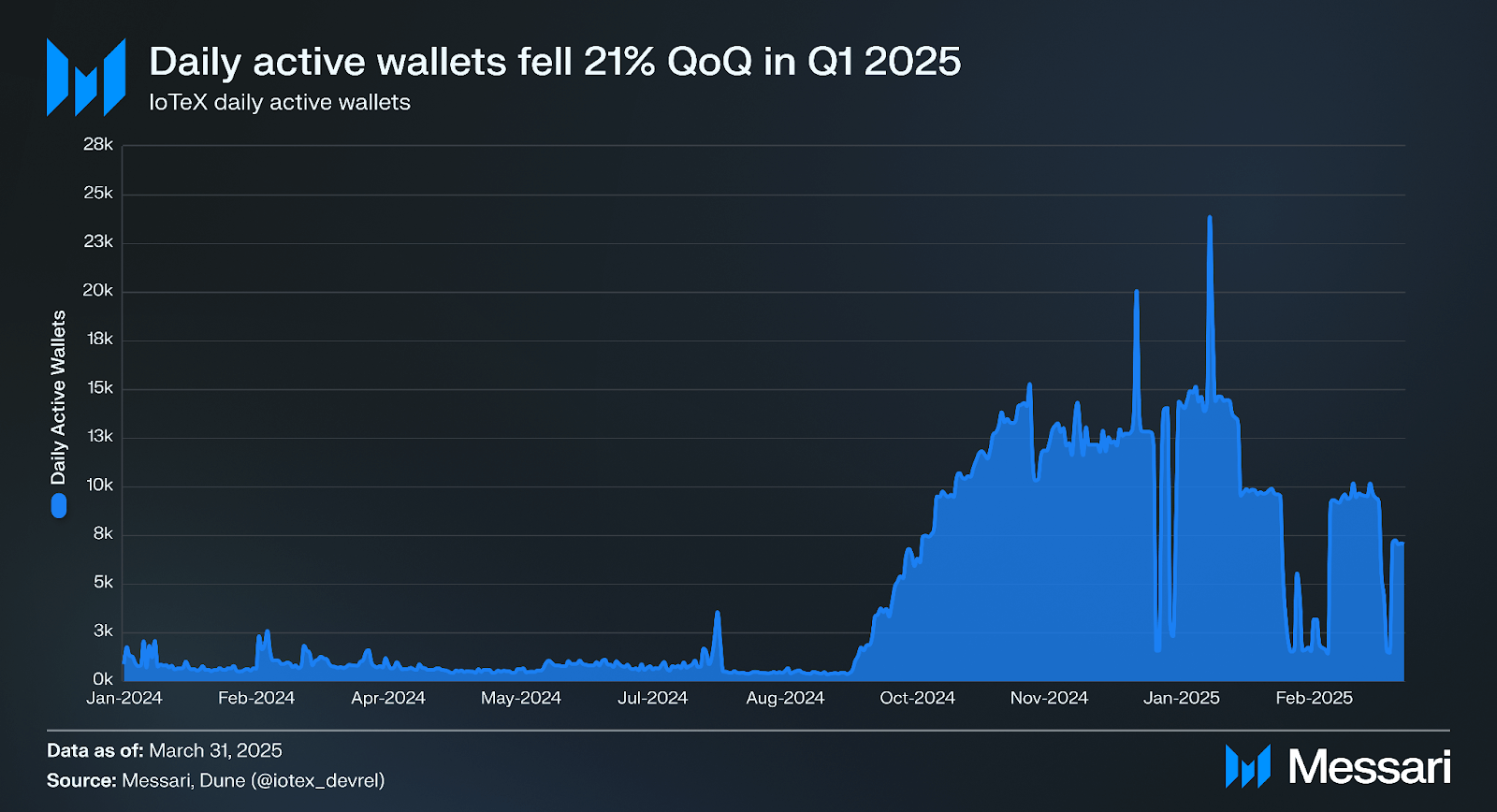
Average daily active wallets on the IoTeX Network fell 21% QoQ from 11,300 to 8,900 in Q1. The decrease may be attributed to the conclusion of the Get Goated Season 2, which included a 100 million IOTX token reward pool and $2 million in contributions from over 15 DePIN projects. This three-month initiative ended Jan. 29 and incentivized users to participate in DeFi and DePIN-related tasks across selected protocols by completing tasks to earn rewards.
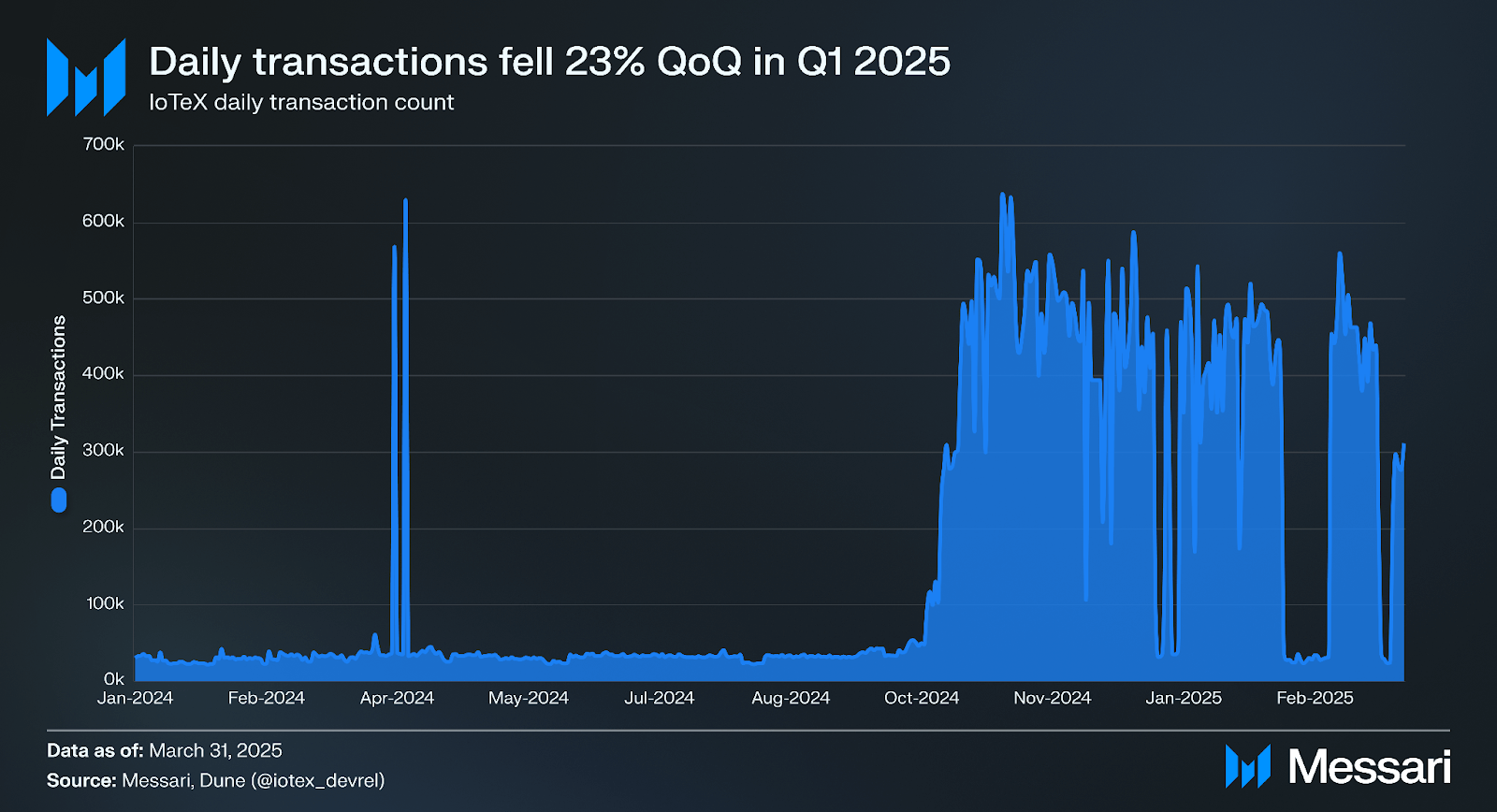
Average daily transactions on the IoTeX Network fell 23% QoQ from 384,300 to 296,500 in Q1. The peak transactions per second averaged 39 in Q1.
Staking Overview
As the native token of the IoTeX Network, IOTX is used to secure the network, validate transactions, and produce new blocks. Additionally, token holders who stake their IOTX tokens can vote for delegates to manage these tasks on their behalf and earn IOTX rewards.
In 2019, IoTeX mainnet allocated 12% of total IOTX supply (1.2 billion IOTX) for staking rewards, but this allocation became nearly exhausted. In 2024, IoTeX 2.0 introduced inflationary staking rewards to solve this, which mints new IOTX tokens to distribute to delegates and stakers participating in network consensus. The annual inflation rate is determined by network-wide governance within a targeted range (6-11% APR staking rewards).
Additionally, the ioID protocol requires IOTX tokens to be burned to create new onchain identities for devices, resulting in a dynamic burn rate based on the total number of new device registrations. Burning IOTX is also required for other actions in the ioID protocol, such as obtaining verifiable credentials (VCs) for decentralized identification (DIDs) and linking device identities to the IoTeX L1 and other DIMs.
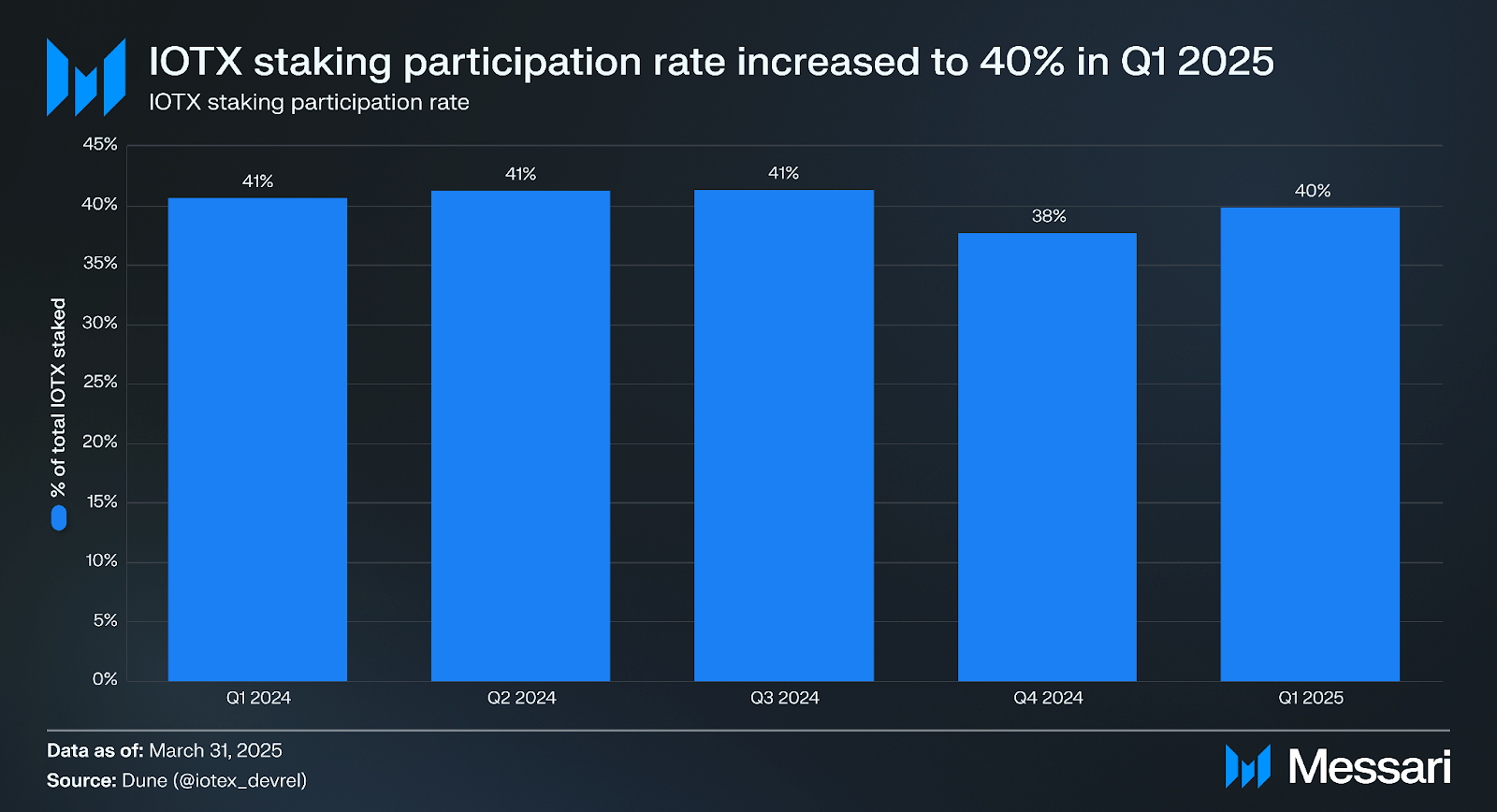
At Q1 close, 120 active delegates secured the IoTeX Network. 3.8 billion IOTX (40% of the circulating supply or $66 million) were staked, a 2% increase QoQ.
Financial Overview
Fees
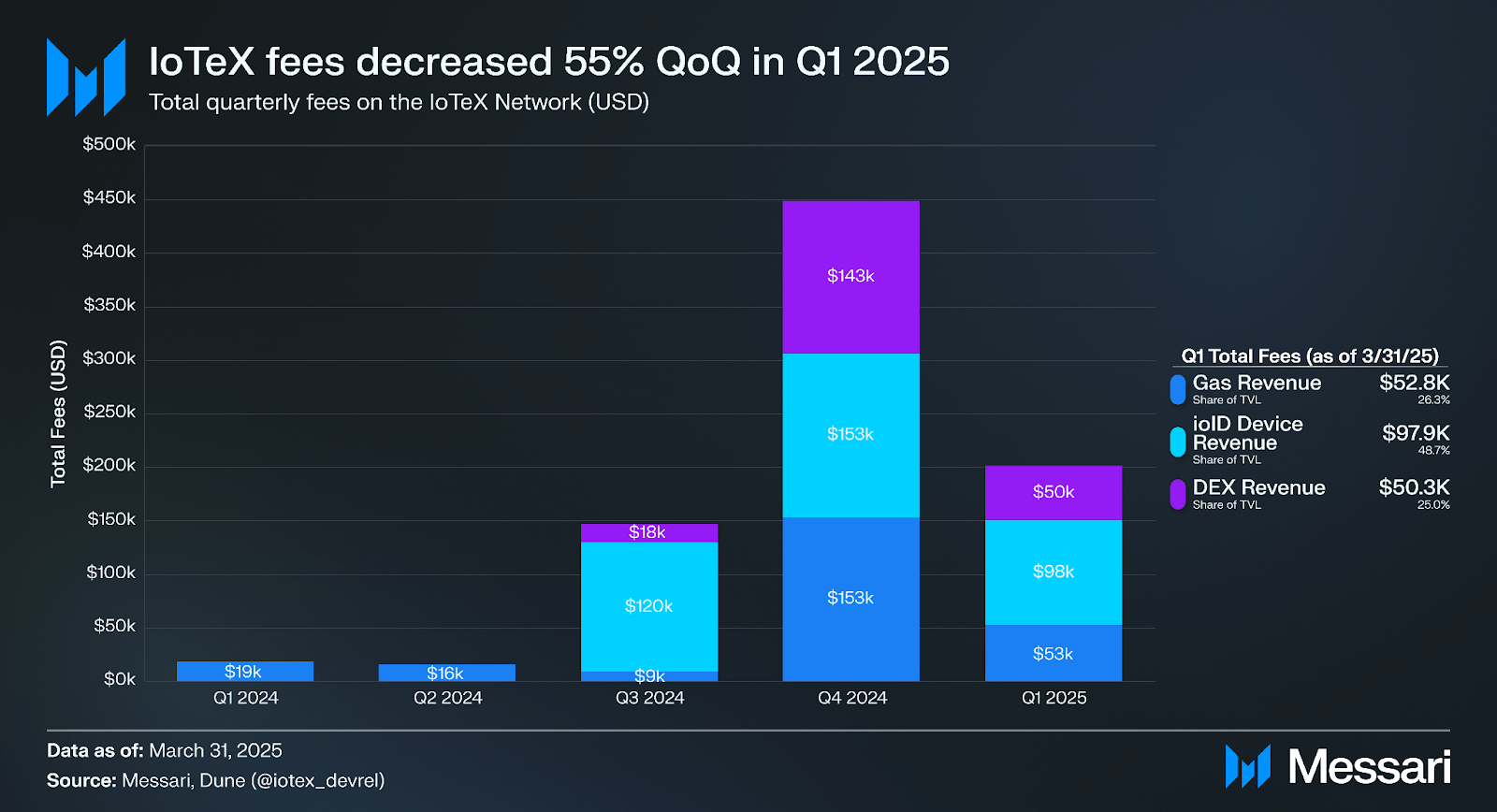
The total fees accrued by the protocol are comprised of three fee types, all paid in IOTX: gas fees, ioID device activation fees, and DEX fees. Gas fees are paid by anyone initiating a transaction on the IoTeX Network, similar to Ethereum’s transaction fee structure. ioID device activation fees are paid to activate an ioID device. DEX fees are paid when using the Mimo decentralized exchange (DEX) as part of the DePIN Liquidity Hub program.
Total fees on the IoTeX Network were $201,000 (7.6 million IOTX), a 55% QoQ decrease in USD terms (25% QoQ decrease in IOTX). This reduction was primarily driven by the 66% QoQ decrease in gas fees from $153,000 (3.5 million IOTX) to $53,000 (2.1 million IOTX) and the 65% QoQ decrease in DEX fees from $143,000 (3.2 million IOTX) to $50,000 (2.1 million IOTX). ioID device activation fees experienced a more moderate decline than these revenue streams, decreasing 36% QoQ from $153,000 (3.5 million IOTX) to $98,000 (3.3 million IOTX). IOTX price decline from $0.04 to $0.02 (55% QoQ decrease) contributed significantly to the IoTeX Network fee reduction in Q1.
Qualitative Analysis & Key Developments
BinoAI x Quicksilver
On Dec. 19, IoTeX integrated AI technology with its ecosystem by introducing the autonomous AI agent BinoAI. Built on ai16z’s open-source ELIZA framework and deployed on the IoTeX Network, BinoAI specializes in knowledge sharing about the DePIN ecosystem. BinoAI autonomously shares knowledge and insights on X (Twitter), from simplifying complex DePIN concepts to highlighting new DePIN projects and achievements. BinoAI uses the IoTeX L1 to securely access and interact with onchain data.
On Jan. 9, IoTeX, ai16z, and Eliza Labs, the creators of ElizaOS, announced a strategic partnership to empower autonomous AI agents to perceive and interact with the physical world through data collection on DePIN networks. Integrating a DePIN plugin for ElizaOS is key to the collaboration as it will enable Eliza agents to retrieve and process real-world data from IoTeX’s DePIN networks. With access to this data, AI agents can gain contextual awareness, enabling them to develop predictive capabilities and adaptive behaviors based on historical and continuously updated inputs. These enhancements aim to improve decision-making and expand the applicability of AI agents in real-world scenarios, from robotics and smart devices to urban management in smart cities. The partnership also gives developers access to IoTeX’s modular DePIN tools through Eliza Labs’ AI Agent Dev School. This initiative includes workshops, tutorials, and technical guides designed to help developers integrate DePIN capabilities into AI workflows, further fostering innovation in the ecosystem.
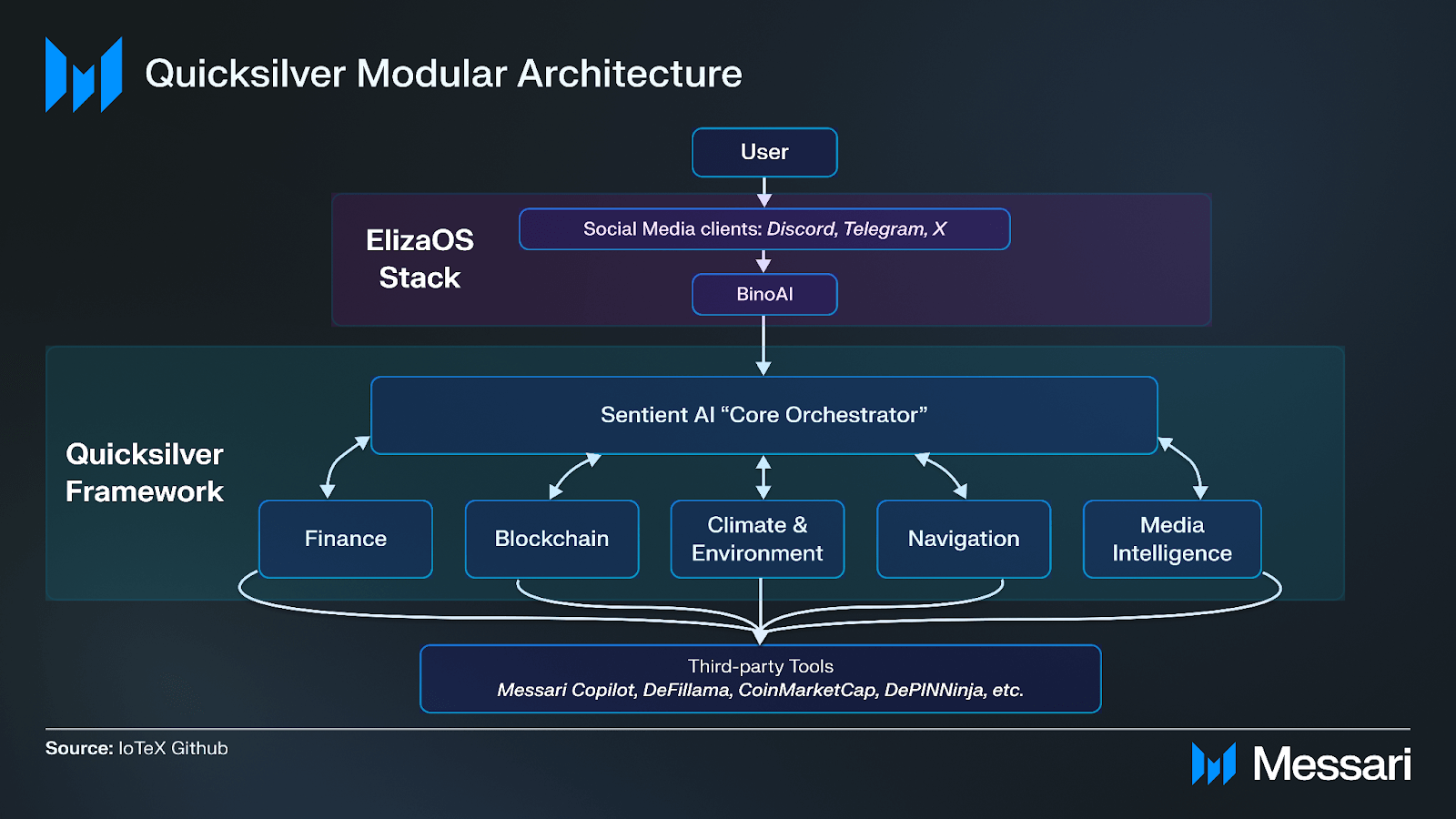
In Q1, IoTeX announced the launch of a new DIM named Quicksilver. Quicksilver is a sentient AI framework for bridging DePIN and AI Agents. Quicksilver’s architecture is modular and includes several components designed to allow for developer customization for various use cases. A sentient AI “core orchestrator” manages interactions and tasks delegation among Quicksilver integrated tools, while a workflow manager handles task automation, enabling structured processes across multiple applications. Additionally, modular tools allow connectivity with multiple DePIN data streams, and LLM integrations including OpenAI (GPT 4o-mini), Anthropic (Claude 3.5 Haiku), and DeepSeek.
IoTeX called upon the community to improve the Quicksilver framework through various contributions, including integrating their DePIN networks into the framework for a more robust data pool and implementing advanced memory systems like conversation buffers to enhance context retention and agent intelligence.
IoTeX has existing Quicksilver integrations with third-party tools, including Messari Copilot, DePIN Ninja, DefiLlama, Nubila, and CoinMarketCap, with plans to add more. The protocol also intends to develop a coordinated network (swarm) of specialized agents orchestrated by Quicksilver, each with distinct roles and capabilities, to solve complex problems and respond to user queries. The swarm will integrate existing and future tools, such as BinoAI, Nubila, and other DePIN-focused applications, to answer DePIN-related user queries.
ioID
In Nov. 2024, IoTeX announced the release of ioID, an onchain identity solution for smart devices. The ioID architecture includes the ioID SDK, decentralized identifiers (DIDs), the IoTeX Hub, ioID NFTs, and smart contracts deployed on IoTeX’s L1. These elements form a framework for managing device identities, securing data, and enabling verifiable device interactions.
ioID device owners increased 80% QoQ from 1,500 to 2,700. ioID identities increased 53% QoQ from 7,500 to 11,500.
The smart contracts on the IoTeX blockchain include an ioID registry contract for onchain device registration, a project registry contract for DePIN project identity management, an ioID NFT contract for issuing NFTs to devices to track identification, and finally, an ioID store contract for managing the lifecycle of device identities (activation, transfer, decommission).
When a device is powered on, the private key for the DID is securely stored on the device, enabling it to sign and verify any data and activities the device produces. The IoTeX Hub is a web portal that facilitates user registration by binding a device’s DID to its ioID NFT, creating an onchain identity. Device owners deposit IOTX to cover fees for smart contract interactions required to activate the ioID. Once activated, the ioID NFT is minted and represents the onchain ownership of the device. The NFT enables its holder to manage the device’s data, perform onchain actions, and collect rewards tied to the device’s activity.
ioID works in tandem with another IoTeX module W3bstream, a verifiable compute protocol designed to validate the real-world activities and data produced by devices in the DePIN ecosystem. W3bstream uses ZK proofs to verify that the data being produced by a device is trustworthy before it is settled onchain.
In Q1 2025, IoTeX accomplished its goal of introducing dual mining reward initiatives with top-tier DePIN projects to enable owners of ioID-equipped devices to mine two tokens simultaneously (i.e. the IOTX token and partner project tokens). The dual rewards are for providing utility to the partner DePIN protocol (i.e. sharing hyperlocal weather data to Nubila) and contributing their verifiable device data and proofs to IoTeX. Below outlines the two initiatives that were started in Q1 2025.
GEODNET
GEODNET is a DePIN protocol that leverages Real-Time Kinematics (RTK) technology to provide precise and cost-effective corrections for GPS and other Global Navigation Satellite Systems (GNSS). It achieves centimeter-level accuracy, applicable to use cases such as autonomous vehicles, agricultural automation, and drone deliveries.
On Jan. 24, GEODNET integrated its GEO-PULSE device with IoTeX’s ioID module to introduce device verifiability. GEO-PULSE is a DePIN device installed on vehicle dashboards, offering high-precision lane-level positioning with 10x greater accuracy than traditional GPS. As GEO-PULSE devices operate in everyday vehicles, they collect real-world location data that is verified using IoTeX’s tech stack, including ioID and W3bstream.
In addition to the technology partnership, IoTeX and GEODNET collaborated to simplify user onboarding for GEO-PULSE devices. When a GEO-PULSE device is activated, it automatically generates an ioID, registering the device’s identifying information onto the IoTeX blockchain and minting an ioID NFT directly into the user’s IoTeX wallet. GEO-PULSE devices sign the collected location data using their embedded ioID, simultaneously transmitting this signed data to GEODNET’s servers and IoTeX’s W3bstream. Upon receiving the data, W3bstream generates ZK proofs to verify location authenticity, creating proofs of liveness, location, and movement. IoTeX’s onchain verifier smart contracts subsequently verify these proofs.
After successful verification, IOTX tokens from the IoTeX-GEODNET questing rewards pool are distributed directly to the ioID NFT holder’s wallet on the IoTeX blockchain. GEO-PULSE device owners also earn GEOD tokens by completing GEODNET network quests. This collaboration represents one of the first live integrations of ioID technology with an operational DePIN protocol.
IoTeX notes that verifiability is important for increasing demand in the DePIN sector. The partnership between IoTeX and GEODNET represents IoTeX’s first end-to-end verifiable use case leveraging onchain device identity and ZK proofs, marking progress toward scaling this sector.
Nubila
Nubila is a DePIN protocol that collects, validates, and monetizes hyperlocal weather and environmental data. On Mar. 18, IoTeX launched its collaboration with Nubila’s Marco portable weather station, enabling participants to contribute data from their Marco devices and receive IOTX tokens through dual mining rewards. As of Dec. 30, over 18,000 Marco devices had been deployed. Marco allows users to collect and share real-time hyperlocal weather data, which is verified and rewarded on the IoTeX blockchain. This data helps participants understand local weather conditions and can be applied in areas such as agriculture and disaster preparedness.
The initiative is structured into five reward phases to incentivize sustained user participation. The initial phase allocates a total of 24,000 IOTX rewards, with subsequent phases progressively increasing rewards up to a total of 100,000 IOTX in Phase 5. Each phase unlocks sequentially, based on participation levels and staking activity, allowing early participants to access multiple phases and thus maximize their total earnings potential. On Mar. 28, Nubila announced the beginning of Dual Mining Phase 2 with a reward pool of 33,333 IOTX tokens.
Participants are required to complete three onboarding steps to qualify their Marco devices for rewards. Initially, users must obtain the Get-Goated NFT by completing social engagement tasks through Nubila’s X (Twitter) and Discord accounts. Following this, they must connect their Marco device to the Nubila application. The final step involves claiming and staking the device NFT within the IoTeX staking pool. Although each user receives only one device NFT, they can operate and link multiple Marco devices to this NFT to increase reward earnings. Users earn Nubila Mining Points that Nubila will convert into NUBI tokens after their TGE.
Closing Summary
In Q1 2025, IoTeX activity decreased as average daily active wallets fell 21% QoQ from 11,300 to 8,900, and average daily transactions declined 23% QoQ from 384,300 to 296,500. Conversely, 120 active delegates staked 3.8 billion IOTX (40% of the circulating supply or $66 million), a 2% increase QoQ. Total fees for the protocol decreased 55% QoQ to $201,000, driven by a 66% drop in gas fees to $53,000, a 65% decline in DEX fees to $50,000, and a 36% reduction in ioID activation fees to $98,000.
Despite the QoQ decline in activity, the IoTeX team continues to innovate. In Q1, IoTeX expanded its DePIN infrastructure suite with the launch of Quicksilver, a framework that enables AI agents to collect and act on decentralized physical data. Dual‑mining rewards for ioID‑equipped devices went live through two partnerships. On Jan. 24, GEODNET’s GEO‑PULSE device became the first live integration of ioID and ZK proofs for end‑to‑end verifiable data. Then on Mar. 18, Nubila’s Marco weather station program introduced a five‑phase reward structure issuing IOTX for staked device data. IoTeX will pursue similar collaborations and integrations in the coming quarters as it continues to emphasize verifiability as a catalyst for DePIN demand.
Let us know what you loved about the report, what may be missing, or share any other feedback by filling out this short form. All responses are subject to our Privacy Policy and Terms of Service.
This report was commissioned by MachineFi. All content was produced independently by the author(s) and does not necessarily reflect the opinions of Messari, Inc. or the organization that requested the report. The commissioning organization may have input on the content of the report, but Messari maintains editorial control over the final report to retain data accuracy and objectivity. Author(s) may hold cryptocurrencies named in this report. This report is meant for informational purposes only. It is not meant to serve as investment advice. You should conduct your own research and consult an independent financial, tax, or legal advisor before making any investment decisions. Past performance of any asset is not indicative of future results. Please see our Terms of Service for more information.
No part of this report may be (a) copied, photocopied, duplicated in any form by any means or (b) redistributed without the prior written consent of Messari®.
